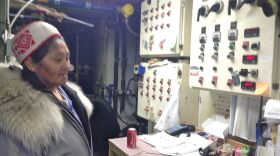3/20/15
Senators on the Finance Committee Thursday questioned Department of Environmental Conservation (DEC) officials, asking just how bad would it be to turn down federal dollars for construction of water and sewer systems.
DEC Administration Director Tom Cherian told legislators the $64 million capital budget DEC submitted is its lowest in ten years. The lion’s share of DEC’s capital budget, $55.5 million, would go to water and sewer projects. Of that, 71% is federal dollars. The state’s share would be a $9 million dollar match.
Wasilla Senator Mike Dunleavy, a Republican, asked Village Safe Water facilities program manager Bill Griffith what would happen if the state didn’t come up with the match.
“If this doesn't happen this year," asked Dunleavey, "what happens? Does the world end; what goes on?”
Griffith said turning down federal dollars would halt a multi-year process that awards funds based on highest public health or environmental need, and community maintenance practices.
"If we don't provide funds to projects that are kind of next in line, some of those have active construction and would have to stop and wait until funds are available," said Griffith. "Other ones are at the point where they're starting up and they too would have to wait until there's funding available in the future.
Dunleavy asked, “So the world wouldn't end.”
“No,” replied Griffith.
“Thank you,” said Dunleavy.
Dunleavy went on say the state is facing a budget deficit, and agencies should be asking only for what’s necessary to avert disaster.
“I"ll be asking this of every department. What is truly the need now that if it's not met now could be catastrophic, and what can wait,” said Dunleavy. “So if there's any way you can come to us and break those things out, that'd be very helpful.”
Eagle River Republican Senator Anna MacKinnon chairs the Senate Finance Committee.
“I would support Sen. Dunleavy's comments, and recognize the federal government is 18 trillion dollars in debt, and that debt is being held by other nations,” said MacKinnon. “Certainly some of it's held in the nation but again it appears that this particular program has a one-to-five match. Can you speak to that if we don't match the money."
For many years, the state of Alaska has contributed the minimum needed to match federal dollars but it has always come up with the match to federal dollars for water and sewer construction. So Griffith said he’d have to find out more about what would happen if the state doesn’t match federal funds.
“I would have to probably research on whether there's any expectatation on when we would provide the match," said Griffith. "I know that every year they expect us to have those federal funds along with the state match obligated within a year.”
Just over six percent of Alaskans, or about 3,300 Alaskan households use honey-buckets as toilets, and get their drinking water from rain catchment, rivers and lakes, or from a central watering point. Alaska has the nation’s highest percentage of people living without plumbing. Studies show the lack of plumbing in Alaska contributes to diseases such as pneumonia, bronchiolitis, abscesses and other skin diseases. Griffith says the health gap between communities with running water and flush toilets and those without is significant.
“Some of these studies have shown that skin infections and respiratory infections are five to ten times higher in communities that don't have a piped water and sewer system,” said Griffith.
Griffith also told Legislators DEC is working with the private sector to come up with lower cost alternatives to centralized water systems. He says six companies are competing to come up with plans for a home-based, decentralized system that would incorporate recycled water.
The Senate Finance Committee will meet again today [Friday] to review SB 26 the Capital budget.
Department of Defense asked to see if SBA 8(a) reforms went too far
Alaska’s Congressional delegation and a dozen other lawmakers are asking the Defense Secretary to study how contracting reform has hurt Alaska Native corporations and tribally owned businesses. The lawmakers sent letters this week to Secretary Ash Carter about the 2010 rule change, known as “Section 811.” Under the 8(a) program of the Small Business Administration, disadvantaged businesses can get government contracts without competing for them. Changes to the program launched a boom for tribes and Alaska Native corporations in the billions of dollars. That led to calls for change.
The Native American Contractors Association says the reform, Section 811, has scared off agencies from hiring Native contractors entirely, and caused others to set a $20 million dollar threshold. Association members hope a Pentagon study of the effects of Section 811 will help make their case, and lead to Congressional action to modify the rule.
Note: Story corrected 3/24/15 to show 3,300 Alaskan households are without plumbing, not 4,500 as stated earlier.



